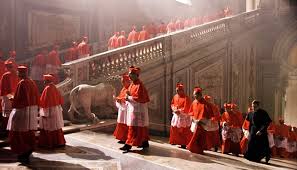 The Papal Conclave is here. With no presidential horserace to handicap, the media has turned its attention to Rome. People who don’t seem to have a religious bone in their body pronounce they find this all “fascinating”—similar to the way they find snake handlers in Appalachia and headhunters in Borneo fascinating.
The Papal Conclave is here. With no presidential horserace to handicap, the media has turned its attention to Rome. People who don’t seem to have a religious bone in their body pronounce they find this all “fascinating”—similar to the way they find snake handlers in Appalachia and headhunters in Borneo fascinating.
For me, this focus on the election of a new pope and the Roman Catholic Church raises the question of why am I not a Roman Catholic? What separates me from my Catholic brothers and sisters? What keeps me from joining them? Not much, or is it?
Many years ago, I recall feeling guilty while reading A Reformation Debate: John Calvin & Jacopo Sadoleto, because I thought Sadoleto made a lot good points. A few years ago, I wrote a Reformation Day note to my congregation suggesting that given the Pandora’s Box the Reformation opened, an appropriate way to mark the day might be to repent. I was amazed at the pushback I received.
The key doctrinal issues that divided Catholic and Protestant 500 years ago have largely evaporated. Justification by grace alone through faith is universally accepted—at least formally. I would say the Catholics have become Protestant! The centrality and uniqueness of Jesus Christ is agreed upon. Last January, leaders of Catholic and Reformed churches in North America signed a “Common Agreement on Mutual Recognition of Baptism” in Austin, Texas
Of course, there are still differences. Do I accept transubstantiation? Not exactly, but also not in a way that would keep me from the Catholics. It might, however, keep them from accepting me. Seven sacraments versus two? I’d opt for two, but don’t find seven to be anathema. Saints? I like saints. Birth control? I know many faithful Catholics who reject their church’s teaching about it—and not with an apathetic shrug, but a compelling theological argument. Semi-Pelagian? So are most people in Reformed churches!
I appreciate Catholic worship, not just its form, but that there are typically both day-laborers and blue haired ladies in attendance. In many areas, the diversity in Catholic congregations looks like the United Nations General Assembly. When my church assemblies and governing bodies are clunky and dysfunctional, I envy a hierarchical episcopate. There is something almost primal, clean, about a Catholic understanding of the Church, even if in modern America it also almost incomprehensible. I wince, but usually don’t correct them, when I hear even Catholic friends refer to Catholicism as their “denomination”!

With all this being true, why when I see the Cardinals in Rome, do I feel unmoved, unsettled, not fascinated, not attracted? It is hard for me to put my finger on it exactly, to find a single word for what separates us. I want it to be more than just “style” or familiarity or preference.
Is the maleness of it all merely incidental? It doesn’t seem that way to me. Why isn’t the maleness of the Catholic church just as easy to ignore as the Catholic teaching on birth-control or transubstantiation? Is celibacy for priests reason enough to remain separate from Catholicism? It hardly seems so. Yet an all-male celibate clergy is emblematic of something that I distrust. It all feels so detached, off-putting, unsuitable for the church of Jesus Christ.
Those clergy—all male, all in their regalia, all vowed to celibacy—flitting around St. Peter’s Square seem artificial and unreal. Isn’t there delicious irony in calling the Catholic church “unnatural”? But that’s what I think. It isn’t real, or at least real enough. My critique isn’t about opulence or materialism. And I’m not a longing for some pure and primitive church from the Book of Acts.
My reaction to the conclave makes me wonder about how others experience my form of Christianity. How are guests in my congregation left to feel? What do they observe among us? Are they deterred by our fixation on Jesus? Probably not. Does it bother them that we insist on hearing from the Bible a lot? Meh. I wonder if it isn’t more about impressions, atmosphere, and ethos—and less about “exclusionary” doctrine. Do they find us authentic? Or do we feel artificial and out of touch?
 I don’t want my objections to Catholicism to be about simply “my way of doing things” or being uncomfortable with the unfamiliar. We Protestants owe it ourselves occasionally to figure out why we’re not Catholic—not in the sense of how wrong they are. But if there aren’t significant differences should we go back?
I don’t want my objections to Catholicism to be about simply “my way of doing things” or being uncomfortable with the unfamiliar. We Protestants owe it ourselves occasionally to figure out why we’re not Catholic—not in the sense of how wrong they are. But if there aren’t significant differences should we go back?

